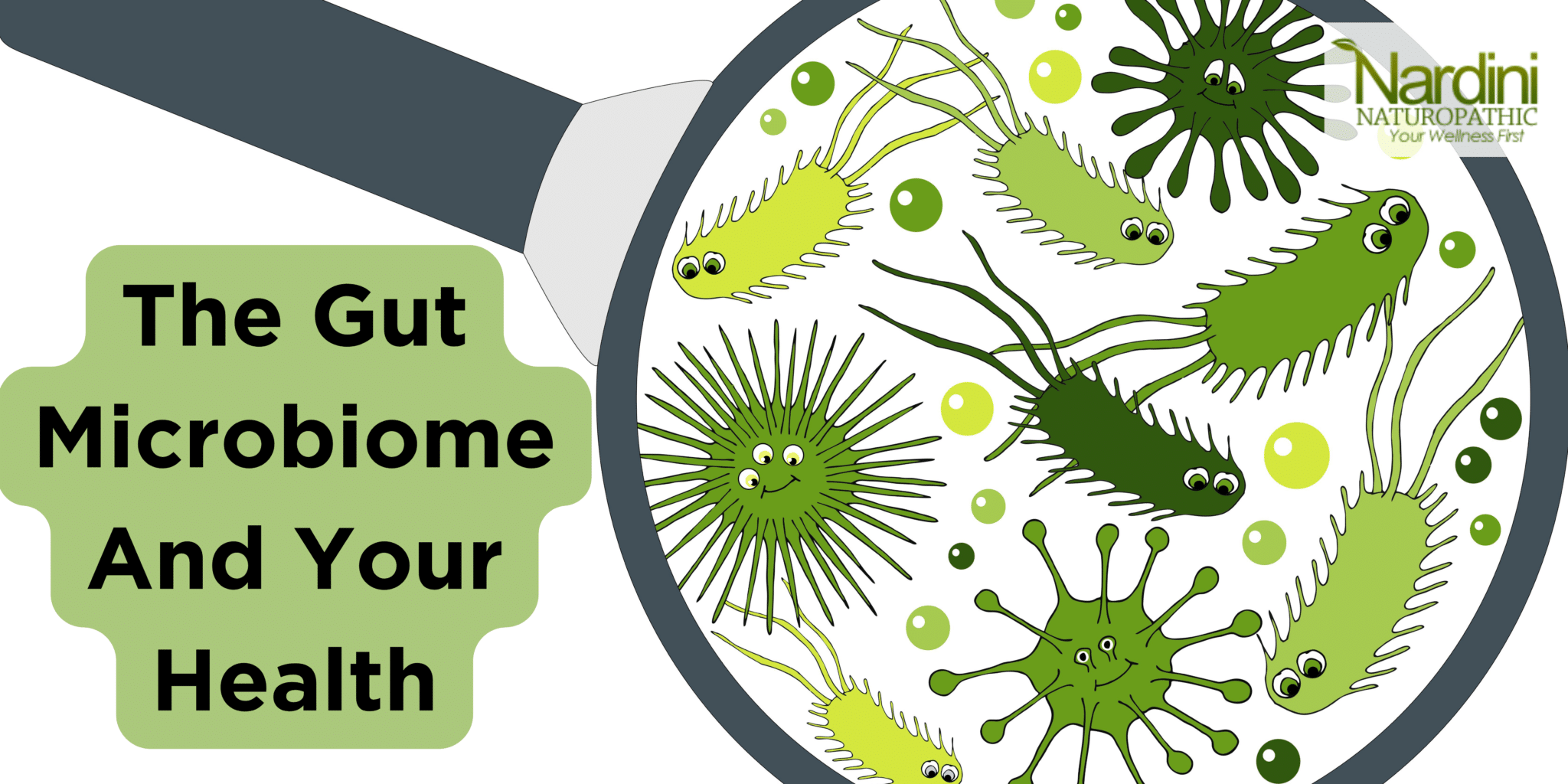It’s estimated that the average human body is comprised of between 30-40 trillion cells1. That sounds like a massive number!
Did you know that there are just as many bacteria and other microbes on and inside the body? That means that about half of the cells that you’re carrying around are not you!
That seems like a lot of foreign cells to be hitching a ride. Are they really freeloaders or do they earn their keep?
The human body’s collection of microorganisms (bacteria and fungi) is referred to as our “microbiome”. It includes the microorganisms on the skin, in the vagina, in the respiratory tract, and inside the digestive tract.
Let’s have a closer look at what the microbiome does for your health and why you really can’t live without it.
Why Is The Microbiome Important?
Although the microbiome refers to the micro-organisms all over the body, the most attention lately has been put on the tiny critters in your digestive tract, what’s called the gut microbiome.
Sometimes referred to as your “microflora”, these bacterial and fungal species make residence in the digestive tract, primarily in the large intestine. But where do they come from?
Right from birth, microorganisms colonize the gut and begin to affect our health. The balance of different microbial species changes over time as we are exposed to different environmental factors, not the least of which is dietary. The number and types of species diversify as we grow2.
Why, exactly, are these microbes there? They obviously are trying to survive but what do they do for us? They’re not considered to be parasites, so they must be doing something for us.
Let’s look at some of the main benefits of the gut microbiome to human health.
1. Improved Gut Health
It makes sense that the gut microbiome will affect the area where it resides.
A major function of some gut bacteria is to digest fibre (called “prebiotics” in this context) into nutrients called short-chain fatty acids. The bacteria themselves feed on these nutrients, but the gut cells, called enterocytes, also use the fatty acids for fuel3. This helps keep the gut cells healthy and able to absorb water and other nutrients from food so that they can be transported to the rest of the body.
Certain species of bacteria of the Bifidobacteria and Lactobacillus groups, that are abundant in fermented foods and probiotic supplements, appear to be helpful for preventing symptoms of Irritable Bowel Syndrome (IBS). A meta-analysis of several studies suggests that probiotic supplements may be of benefit in the treatment of IBS symptoms4.
2. Brain Booster
Much has been made in recent years of the “gut-brain connection”. This hypothesis proposes that factors in the digestive tract will affect the central nervous system (the brain and spinal cord) and vice versa.
For anyone who has felt “butterflies” in their stomach when nervous or has felt “brain fog” after eating something not-so-healthy, you would likely agree that there is something to this.
The gut microbiome is also thought to play a role in this gut-brain axis.
Neurotransmitters are a group of important signalling chemicals that are involved in nerve transmission. Serotonin, the so-called “happiness molecule”, is a neurotransmitter that plays a crucial role in central nervous system function and is made primarily in the gut. Research suggests that gut bacteria play a role in regulating the production of serotonin, and thus, affecting mood5.
The species profile of the microbiome may be an important factor in one’s mental health. A review article in 2015 concluded that people with depressive symptoms tend to have different populations of bacteria compared to those without these symptoms6. It’s difficult to determine if the altered bacteria were the cause of the depression or vice versa (or both or neither). The subject is certainly in need of more research to better understand this relationship.
On the therapy side of things, there is some research that shows that supplementation with probiotics may help with symptoms of depression and, possibly, other mental health issues7.
3. Blood Sugar Management and Weight
It might not seem obvious that the gut flora has anything to do with blood sugar and weight. However, research suggests that this is very much the case.
A review of the literature published in 2020 showed an association between certain bacterial species and the prevalence of type 2 diabetes8. Some species were more prevalent in type 2 diabetes patients and others, like Bifidobacteria, more numerous in those without diabetes. It’s still to be determined through what mechanism the gut microflora affects blood sugar.
Since diabetes and other blood sugar imbalances are associated with weight gain and obesity, it makes sense that the microbiome could also affect your weight.
A study on young adult female twins revealed a significant difference between the gut microbiomes of those who were obese and those of normal weight9. The obese twins had less bacterial diversity and differed in dominant strains compared to lean twins.
Whether the microbial differences are causing the obesity or are a result of it is not well understood. Once thing is clear – your gut microbiome plays a role in blood sugar control and weight management.
How Do You Keep Your Microbiome Healthy?
We often hear that is it’s important to “feed the good bacteria” in your gut to maintain good health. I would certainly agree with this idea as I work with many people dealing with digestive problems in my practice as a naturopathic doctor.
It makes a lot of sense: whenever they have tried to feed people by intravenous nutrition only for extended periods, the person’s health inevitably declines. One of the reasons for this is that the gut microflora are not getting any nutrition that way and they start to die off.
So, how do we keep the gut microbiome, and thereby ourselves, healthy?
- Include prebiotics in your diet – soluble types of fibre from legumes and fruit feed the beneficial bacteria species, like Bifidobacteria.
- Eat fermented foods – yogurt, kefir, sauerkraut, and kimchi are fermented foods that contain prebiotics and healthy bacteria, like Lactobaccilli.
- Avoid artificial sweeteners – non-nutritive sweeteners, like aspartame and sucralose, can negatively impact blood sugar and, by extension, may affect gut microflora composition.
- Breastfeeding – infants exclusively breast fed from birth to 6 weeks of age had higher levels of beneficial Bifidobacteria compared to infants fed formula or a combination of the two10.
- Avoid unnecessary antibiotics – antibiotics can significantly alter the gut microbiome, leading to many potential health issues.
- Take a probiotic – supplements that contain age-specific and multiple strains of Lactobaccillus and Bifidobacteriastrains may help promote a healthy microbiome. Colony counts should be in the 15-30 billion range per dose.
- .
With these tips at your disposal, you’ll be able to keep your “other half” happy and healthy!
- https://www.medicalnewstoday.com/articles/318342#Lack-of-coordinated-effort
- https://pubmed.ncbi.nlm.nih.gov/20668239/
- https://www.ncbi.nlm.nih.gov/pmc/articles/PMC3705355/
- https://pubmed.ncbi.nlm.nih.gov/18461650/
- https://www.ncbi.nlm.nih.gov/pmc/articles/PMC4393509/
- https://www.sciencedirect.com/science/article/pii/S0889159115001105?via%3Dihub
- https://pubmed.ncbi.nlm.nih.gov/28483500/
- https://www.ncbi.nlm.nih.gov/pmc/articles/PMC6948163/
- https://www.ncbi.nlm.nih.gov/pmc/articles/PMC2677729/
- https://www.ncbi.nlm.nih.gov/pmc/articles/PMC4783194/
Book An Appointment With Nardini Naturopathic
Are you interested in finding out if you need help with your microbiome?
Or perhaps you’d like a review of your overall diet to see where you could be doing better.
Maybe you have food allergies or intolerances and worry you aren’t getting enough nutrients because of your restricted diet.
I’m Dr. Pat Nardini, a naturopathic doctor who offers nutritional counseling services to help ensure all of those gaps in your diet are filled, and that you’re getting enough of all the important nutrients which your body needs to function at its best.
Contact me today for more information, or book a free 15-minute consultation where I will help you understand how naturopathic medicine can help you.
If you have questions about naturopathic medicine, or you’d like to take your first step into the world of naturopathy, contact us at Nardini Naturopathic, and let’s book an appointment.
Yours in health,
Dr. Pat Nardini, Naturopathic Doctor
320 Danforth Ave suite 206,
Toronto, ON, M4K 1N8
-https://g.page/NardiniNaturopathicDanforth
Dr. Pat Nardini, ND is a licensed doctor of naturopathic medicine in Toronto, Ontario. He offers science based natural health solutions with a special focus on thyroid conditions.

